Quentin Brabant
On the Robustness of Temporal Factual Knowledge in Language Models
Feb 03, 2025Abstract:This paper explores the temporal robustness of language models (LMs) in handling factual knowledge. While LMs can often complete simple factual statements, their ability to manage temporal facts (those valid only within specific timeframes) remains uncertain. We design a controlled experiment to test the robustness of temporal factual knowledge inside LMs, which we use to evaluate several pretrained and instruction-tuned models using prompts on popular Wikidata facts, assessing their performance across different temporal granularities (Day, Month, and Year). Our findings indicate that even very large state-of-the-art models, such as Llama-3.1-70B, vastly lack robust knowledge of temporal facts. In addition, they are incapable of generalizing their knowledge from one granularity to another. These results highlight the inherent limitations of using LMs as temporal knowledge bases. The source code and data to reproduce our experiments will be released.
Question Generation in Knowledge-Driven Dialog: Explainability and Evaluation
Apr 11, 2024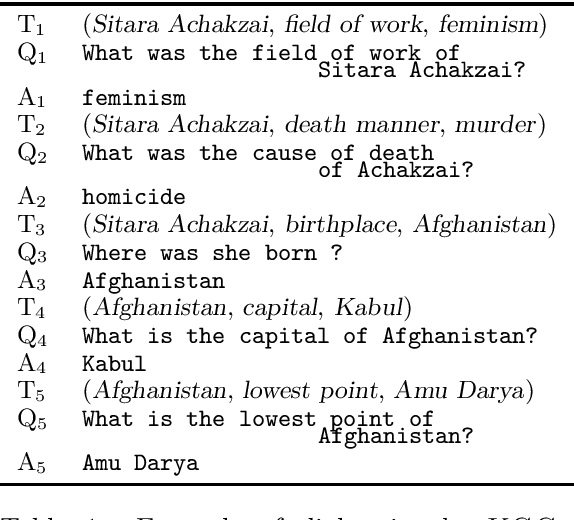
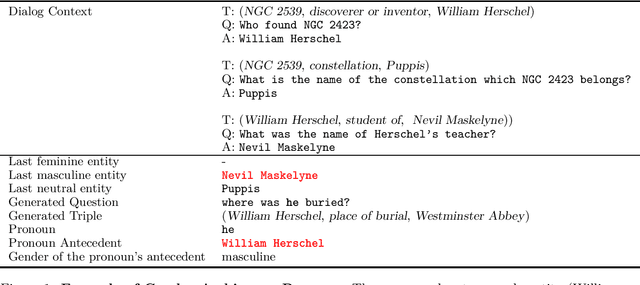
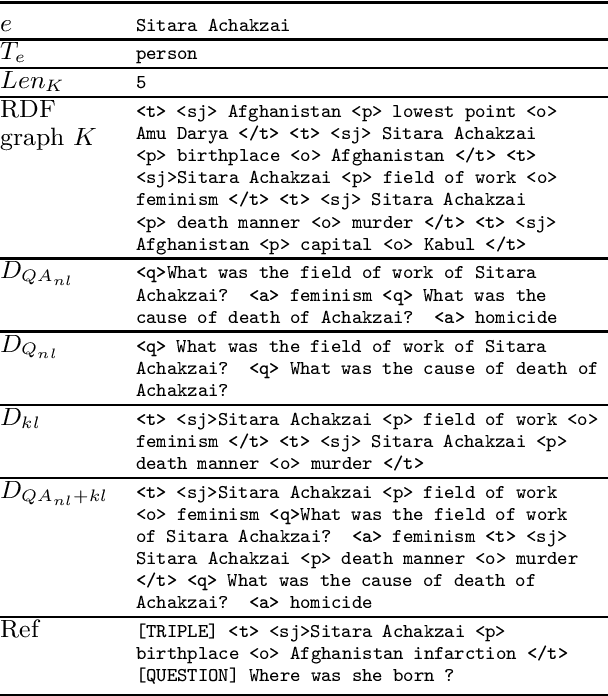
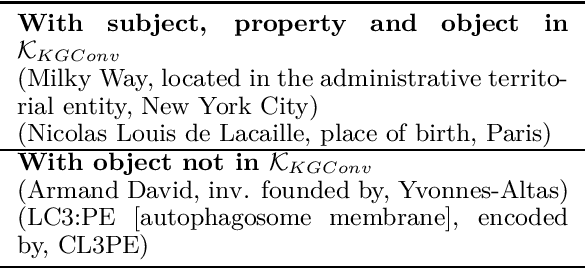
Abstract:We explore question generation in the context of knowledge-grounded dialogs focusing on explainability and evaluation. Inspired by previous work on planning-based summarisation, we present a model which instead of directly generating a question, sequentially predicts first a fact then a question. We evaluate our approach on 37k test dialogs adapted from the KGConv dataset and we show that, although more demanding in terms of inference, our approach performs on par with a standard model which solely generates a question while allowing for a detailed referenceless evaluation of the model behaviour in terms of relevance, factuality and pronominalisation.
WikiFactDiff: A Large, Realistic, and Temporally Adaptable Dataset for Atomic Factual Knowledge Update in Causal Language Models
Mar 21, 2024Abstract:The factuality of large language model (LLMs) tends to decay over time since events posterior to their training are "unknown" to them. One way to keep models up-to-date could be factual update: the task of inserting, replacing, or removing certain simple (atomic) facts within the model. To study this task, we present WikiFactDiff, a dataset that describes the evolution of factual knowledge between two dates as a collection of simple facts divided into three categories: new, obsolete, and static. We describe several update scenarios arising from various combinations of these three types of basic update. The facts are represented by subject-relation-object triples; indeed, WikiFactDiff was constructed by comparing the state of the Wikidata knowledge base at 4 January 2021 and 27 February 2023. Those fact are accompanied by verbalization templates and cloze tests that enable running update algorithms and their evaluation metrics. Contrary to other datasets, such as zsRE and CounterFact, WikiFactDiff constitutes a realistic update setting that involves various update scenarios, including replacements, archival, and new entity insertions. We also present an evaluation of existing update algorithms on WikiFactDiff.
WEBDial, a Multi-domain, Multitask Statistical Dialogue Framework with RDF
Jan 08, 2024



Abstract:Typically available dialogue frameworks have adopted a semantic representation based on dialogue-acts and slot-value pairs. Despite its simplicity, this representation has disadvantages such as the lack of expressivity, scalability and explainability. We present WEBDial: a dialogue framework that relies on a graph formalism by using RDF triples instead of slot-value pairs. We describe its overall architecture and the graph-based semantic representation. We show its applicability from simple to complex applications, by varying the complexity of domains and tasks: from single domain and tasks to multiple domains and complex tasks.
KGConv, a Conversational Corpus grounded in Wikidata
Aug 29, 2023



Abstract:We present KGConv, a large, conversational corpus of 71k conversations where each question-answer pair is grounded in a Wikidata fact. Conversations contain on average 8.6 questions and for each Wikidata fact, we provide multiple variants (12 on average) of the corresponding question using templates, human annotations, hand-crafted rules and a question rewriting neural model. We provide baselines for the task of Knowledge-Based, Conversational Question Generation. KGConv can further be used for other generation and analysis tasks such as single-turn question generation from Wikidata triples, question rewriting, question answering from conversation or from knowledge graphs and quiz generation.
CoQAR: Question Rewriting on CoQA
Jul 07, 2022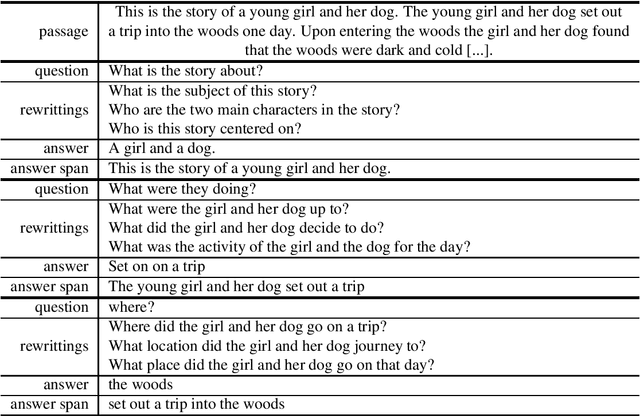
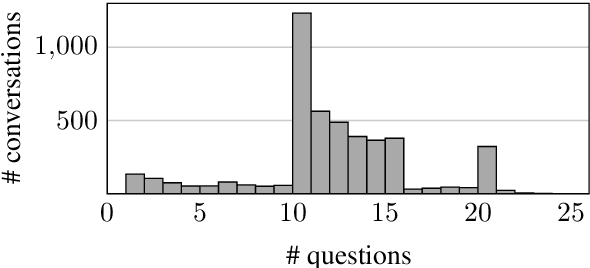

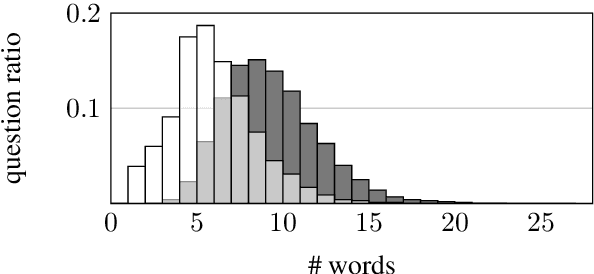
Abstract:Questions asked by humans during a conversation often contain contextual dependencies, i.e., explicit or implicit references to previous dialogue turns. These dependencies take the form of coreferences (e.g., via pronoun use) or ellipses, and can make the understanding difficult for automated systems. One way to facilitate the understanding and subsequent treatments of a question is to rewrite it into an out-of-context form, i.e., a form that can be understood without the conversational context. We propose CoQAR, a corpus containing $4.5$K conversations from the Conversational Question-Answering dataset CoQA, for a total of $53$K follow-up question-answer pairs. Each original question was manually annotated with at least 2 at most 3 out-of-context rewritings. CoQAR can be used in the supervised learning of three tasks: question paraphrasing, question rewriting and conversational question answering. In order to assess the quality of CoQAR's rewritings, we conduct several experiments consisting in training and evaluating models for these three tasks. Our results support the idea that question rewriting can be used as a preprocessing step for question answering models, thereby increasing their performances.
Active Learning and Multi-label Classification for Ellipsis and Coreference Detection in Conversational Question-Answering
Jul 07, 2022Abstract:In human conversations, ellipsis and coreference are commonly occurring linguistic phenomena. Although these phenomena are a mean of making human-machine conversations more fluent and natural, only few dialogue corpora contain explicit indications on which turns contain ellipses and/or coreferences. In this paper we address the task of automatically detecting ellipsis and coreferences in conversational question answering. We propose to use a multi-label classifier based on DistilBERT. Multi-label classification and active learning are employed to compensate the limited amount of labeled data. We show that these methods greatly enhance the performance of the classifier for detecting these phenomena on a manually labeled dataset.
 Add to Chrome
Add to Chrome Add to Firefox
Add to Firefox Add to Edge
Add to Edge